Items filtered by date: October 2024
Do Your Child's Feet Hurt?
Relief for an Ingrown Toenail
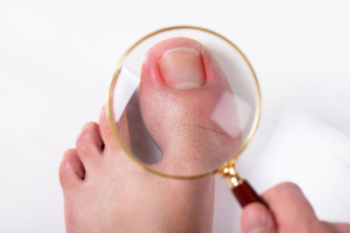
An ingrown toenail occurs when the edge of a toenail grows into the surrounding skin, leading to pain, redness, and swelling. This condition is often caused by several factors, including improper nail trimming, wearing tight footwear, or an injury to the toe. Additionally, genetic predisposition and conditions like fungal infections can contribute to the likelihood of developing an ingrown toenail. Finding relief typically involves proper care and, in more severe cases, professional treatment. Soaking the affected foot in warm, soapy water can help reduce swelling and relieve discomfort. Wearing loose-fitting shoes and avoiding pressure on the toe is important for recovery. If you have developed an ingrown toenail, it is suggested that you consult a podiatrist who can effectively treat this condition.
Ingrown toenails can become painful if they are not treated properly. For more information about ingrown toenails, contact the foot specialists of Podiatry Associates of Belleville. Our doctors can provide the care you need to keep you pain-free and on your feet.
Ingrown Toenails
Ingrown toenails occur when a toenail grows sideways into the bed of the nail, causing pain, swelling, and possibly infection.
Causes
- Bacterial infections
- Improper nail cutting such as cutting it too short or not straight across
- Trauma to the toe, such as stubbing, which causes the nail to grow back irregularly
- Ill-fitting shoes that bunch the toes too close together
- Genetic predisposition
Prevention
Because ingrown toenails are not something found outside of shoe-wearing cultures, going barefoot as often as possible will decrease the likeliness of developing ingrown toenails. Wearing proper fitting shoes and using proper cutting techniques will also help decrease your risk of developing ingrown toenails.
Treatment
Ingrown toenails are a very treatable foot condition. In minor cases, soaking the affected area in salt or antibacterial soaps will not only help with the ingrown nail itself, but also help prevent any infections from occurring. In more severe cases, surgery is an option. In either case, speaking to your podiatrist about this condition will help you get a better understanding of specific treatment options that are right for you.
If you have any questions please feel free to contact our office located in Belleville, NJ . We offer the newest diagnostic and treatment technologies for all your foot and ankle needs.
Children’s Foot Pain That Requires Care
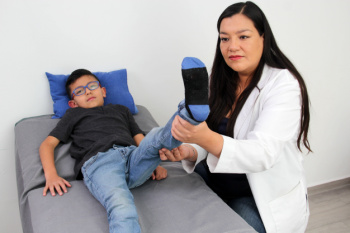
Foot pain is common in active children due to sports, play, or growth. While many foot aches resolve on their own with rest, certain symptoms can signify severe foot problems that need podiatric attention. If your child is unable to move or stand on their foot, or if the foot appears twisted or out of place, it could indicate a more serious injury. An unstable foot when stepping down is also a sign that something is wrong. Infections in the foot can present as increased pain, swelling, warmth, or redness. Red streaks leading from the sore area or pus draining from a spot on the foot should not be ignored, especially if your child develops a fever. In these cases, it is strongly suggested that you visit a podiatrist who can diagnose and treat conditions early to prevent long-term complications.
Making sure that your children maintain good foot health is very important as they grow. If you have any questions, contact the foot specialists of Podiatry Associates of Belleville. Our doctors can provide the care you need to keep you pain-free and on your feet.
Keeping Children's Feet Healthy
Having healthy feet during childhood can help prevent medical problems later in life, namely in the back and legs. As children grow, their feet require different types of care. Here are some things to consider...
Although babies do not walk yet, it is still very important to take care of their feet.
Avoid putting tight shoes or socks on his or her feet.
Allow the baby to stretch and kick his or her feet to feel comfortable.
As a toddler, kids are now on the move and begin to develop differently. At this age, toddlers are getting a feel for walking, so don’t be alarmed if your toddler is unsteady or ‘walks funny’.
As your child gets older, it is important to teach them how to take care of their feet.
Show them proper hygiene to prevent infections such as fungus.
Be watchful for any pain or injury.
Have all injuries checked by a doctor as soon as possible.
Comfortable, protective shoes should always be worn, especially at play.
If you have any questions please feel free to contact our office located in Belleville, NJ . We offer the newest diagnostic and treatment technologies for all your foot and ankle needs.
Caring for Diabetic Feet
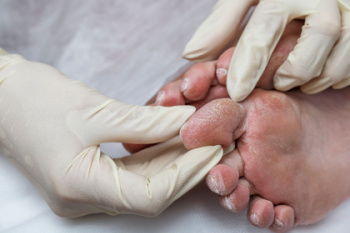
Diabetic foot care is essential for preventing serious complications like foot ulcers, infections, and even amputations. People with diabetes are at higher risk for foot problems due to poor circulation and nerve damage, which can lead to unnoticed injuries. Education on proper foot care is imperative to minimize these risks. Those with diabetes should inspect their feet daily for cuts, blisters, or signs of infection, and keep feet clean and dry. Properly fitting shoes and regular podiatrist visits are important for preventing pressure points and ulcers. Foot ulcers are open sores that can develop from small injuries, becoming serious if left untreated. They require immediate attention, as untreated ulcers can lead to severe infections and potential amputations. If you have diabetes, it is suggested that you have routine visits with a podiatrist to proactively prevent serious foot problems and to educate you on how to maintain healthier feet.
Diabetic foot care is important in preventing foot ailments such as ulcers. If you are suffering from diabetes or have any other concerns about your feet, contact the foot specialists from Podiatry Associates of Belleville. Our doctors can provide the care you need to keep you pain-free and on your feet.
Diabetic Foot Care
Diabetes affects millions of people every year. The condition can damage blood vessels in many parts of the body, especially the feet. Because of this, taking care of your feet is essential if you have diabetes, and having a podiatrist help monitor your foot health is highly recommended.
The Importance of Caring for Your Feet
- Routinely inspect your feet for bruises or sores.
- Wear socks that fit your feet comfortably.
- Wear comfortable shoes that provide adequate support.
Patients with diabetes should have their doctor monitor their blood levels, as blood sugar levels play such a huge role in diabetic care. Monitoring these levels on a regular basis is highly advised.
It is always best to inform your healthcare professional of any concerns you may have regarding your feet, especially for diabetic patients. Early treatment and routine foot examinations are keys to maintaining proper health, especially because severe complications can arise if proper treatment is not applied.
If you have any questions please feel free to contact our office located in Belleville, NJ . We offer the newest diagnostic and treatment technologies for all your foot and ankle needs.
Consulting a Podiatrist for Ankle Pain
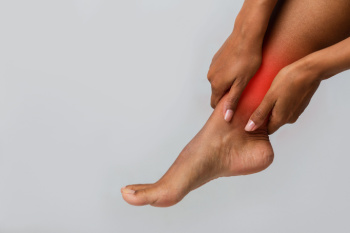
Ankle pain can result from various causes, ranging from acute injuries to chronic conditions. Common causes include sprains, where ligaments are stretched or torn due to sudden twisting motions, and tendonitis, which occurs when tendons surrounding the ankle become inflamed from overuse. Arthritis, particularly osteoarthritis, can lead to ankle pain over time due to joint wear and tear. Stress fractures or broken bones may also cause severe ankle pain following trauma. In some cases, flat feet or improper foot mechanics can put strain on the ankle, leading to discomfort. If pain persists or worsens, it is suggested that you visit a podiatrist for a proper diagnosis and treatment.
Ankle pain can be caused by a number of problems and may be potentially serious. If you have ankle pain, consult with the foot specialists from Podiatry Associates of Belleville. Our doctors will assess your condition and provide you with quality foot and ankle treatment.
Ankle pain is any condition that causes pain in the ankle. Due to the fact that the ankle consists of tendons, muscles, bones, and ligaments, ankle pain can come from a number of different conditions.
Causes
The most common causes of ankle pain include:
- Types of arthritis (rheumatoid, osteoarthritis, and gout)
- Ankle sprains
- Broken ankles
- Achilles tendonitis
- Achilles tendon rupture
- Stress fractures
- Bursitis
- Tarsal tunnel syndrome
- Plantar fasciitis
Symptoms
Symptoms of ankle injury vary based upon the condition. Pain may include general pain and discomfort, swelling, aching, redness, bruising, burning or stabbing sensations, and/or loss of sensation.
Diagnosis
Due to the wide variety of potential causes of ankle pain, podiatrists will utilize a number of different methods to properly diagnose ankle pain. This can include asking for personal and family medical histories and of any recent injuries. Further diagnosis may include sensation tests, a physical examination, and potentially x-rays or other imaging tests.
Treatment
Just as the range of causes varies widely, so do treatments. Some more common treatments are rest, ice packs, keeping pressure off the foot, orthotics and braces, medication for inflammation and pain, and surgery.
If you have any questions, please feel free to contact our office located in Belleville, NJ . We offer the newest diagnostic and treatment technologies for all your foot care needs.
How Foot Function in Diabetic Patients Relates to Limb Salvage
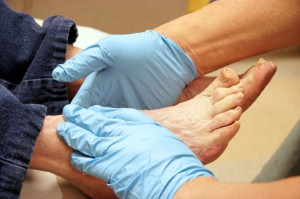
Diabetes can lead to peripheral neuropathy and poor circulation, making the foot more vulnerable to injuries. Altered foot biomechanics, such as abnormal pressure distribution or foot deformities, can increase the risk of ulcers, particularly in weight-bearing areas like the heel or ball of the foot. Without the protective sensation due to neuropathy, individuals may not notice injuries, which, combined with poor healing due to impaired circulation, can escalate to infections or deep tissue damage. This increases the risk of gangrene and amputation. Limb salvage focuses on correcting or accommodating these biomechanical issues to prevent ulceration and promote healing. This may involve custom orthotics, offloading devices, or surgical intervention to correct deformities. Early detection, proper foot care, and regular monitoring are essential to avoid complications and preserve limb function in diabetic patients. If you have diabetes, it is strongly suggested that you visit a podiatrist regularly to have your feet examined, so any abnormalities or injuries can be promptly treated.
Diabetic Limb Salvage
Diabetic limb salvage can be an effective way in preventing the need for limb amputation. If you have a foot ulcer and diabetes, consult with the foot specialists from Podiatry Associates of Belleville. Our doctors will assess your condition and provide you with quality foot and ankle treatment.
What Is Diabetic Limb Salvage?
Diabetic limb salvage is the attempt of saving a limb, such as the foot, that has an infected ulcer, from amputation. Podiatrists also try to make sure that there is enough function in the foot after the salvage that it is still usable. Those with diabetes experience poor blood circulation, which prevents proper healing of an ulcer. If the ulcer is left uncheck, it could become infected, which could result in the need for amputation.
Diabetes is the number one cause of non-traumatic amputations in the United States. Amputation has been found to lead to higher mortality rates. This translates into higher healthcare costs, and a reduced quality of life and mobility for amputees. Podiatrists have attempted to increase the prevalence of limb salvage in an attempt to solve these issues.
Diagnosis and Treatment
Limb salvage teams have grown in recent years that utilize a number of different treatments to save the infected limb. This includes podiatrists that specialize in wound care, rehabilitation, orthotics, and surgery. Through a combination of these methods, limb salvage has been found to be an effective treatment for infected limbs, and as an alternative to amputation. Podiatrists will first evaluate the potential for limb salvage and determine if the limb can be saved or must be amputated.
If you have any questions, please feel free to contact our office located in Belleville, NJ . We offer the newest diagnostic and treatment technologies for all your foot care needs.
